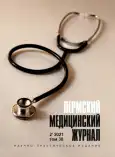Studying of dynamics of Alzheimer's disease symptoms manifestation against the background of COVID-19 in department № 5 for treatment of COVID-19, city clinical hospital № 2 named after F.H. Gral
- Authors: Karakulova Y.V.1, Sokolova E.S.1,2, Palamarenko M.A.1,2, Koryakin E.S.1,2, Novikov A.A.1, Trushnikova T.N.1
-
Affiliations:
- E.A. Vagner Perm State Medical University
- City Clinical Hospital № 2 named after F.H. Gral
- Issue: Vol 38, No 2 (2021)
- Pages: 111-119
- Section: Clinical case
- URL: https://journal-vniispk.ru/PMJ/article/view/58168
- DOI: https://doi.org/10.17816/pmj382111-119
- ID: 58168
Cite item
Full Text
Abstract
A clinical case was analyzed, the regularity and dynamics of psychoneurological symptoms was studied in a patient with a moderately severe form of the course of a new coronavirus infection with concomitant neurodegenerative disease – Alzheimer's disease.
The patient aged 73 was admitted to the City Clinical Hospital №2 named after F.H. Gral by the team of emergency care with identified COVID-19. When admitted to the hospital, she had disability group 2 regarding neurodegenerative disease – Alzheimer's disease. A multispiral computed tomography of the head revealed the following: internal open substitutional hydrocephalus, moderately expressed bilateral leukoaraiosis, cerebral atrophy, predominantly in temporoparietal region, that is typical for Alzheimer's disease.
The results of tests indicated a decrease in cognitive status. In the test with figures, the patient could not find the required figure for the desired time. When conducting “clock-drawing test” in dynamics, at the second attempt the patient needed about 7 minutes; a worse capability for drawing was noted; apraxia was observed. The result of the test “6CIT” at the second attempt, carried out before discharge from the hospital became worse – she could answer only one of four questions, whereas at the first attempt, when admitted, she could answer two questions of four. By the time of discharge from the hospital, the patient was noted to have more pronounced cognitive disorders than at admission. Emotional lability, nervousness and anxiety also remain.
Full Text
##article.viewOnOriginalSite##About the authors
Yulia V. Karakulova
E.A. Vagner Perm State Medical University
Email: julia.karakulova@mail.ru
MD, PhD, Professor, Head of Department of Neurology and Medical Genetics
Russian Federation, PermElizaveta S. Sokolova
E.A. Vagner Perm State Medical University; City Clinical Hospital № 2 named after F.H. Gral
Email: e-li1999@mail.ru
forth-year student of Medical Faculty
Russian Federation, PermMaria A. Palamarenko
E.A. Vagner Perm State Medical University; City Clinical Hospital № 2 named after F.H. Gral
Author for correspondence.
Email: maria.palamarenko@mail.ru
forth-year student of Medical Faculty
Russian Federation, PermEgor S. Koryakin
E.A. Vagner Perm State Medical University; City Clinical Hospital № 2 named after F.H. Gral
Email: egor-koryakin1998@mail.ru
forth-year student of Medical Faculty
Russian Federation, PermAnatoly A. Novikov
E.A. Vagner Perm State Medical University
Email: toliknovik2000@mail.ru
forth-year student of Medical Faculty
Russian Federation, PermTatiana N. Trushnikova
E.A. Vagner Perm State Medical University
Email: trushnikova.t@mail.ru
Candidate of Medical Sciences, Assistant, Department of Neurology and Medical Genetics
Russian Federation, PermReferences
- Adeel S. Zubair et al. Neuropathogenesis and Neurologic Manifestations of the Coronaviruses in the Age of Coronavirus Disease 2019. JAMA Neurology 2020; May..
- Chen T., Wu D., Chen H. et al. Clinical characteristics of 113 deceased patients with coronavirus disease 2019: retrospective study. BMJ 2020; 368.
- Cheng S.K.-W., Tsang J.S.-K., Ku K.-H., Wong C.-W., Ng Y.-K. Psychiatric complications in patients with severe acute respiratory syndrome (SARS) during the acute treatment phase: a series of 10 cases. Br J Psychiatry 2004; 184: 359–360.
- Huang K.J., Wu I.J., Theron M. et al. An interferon-γ-related cytokine storm in SARS patients. J Med Virol 2005; 75: 185–194.
- Kim J.E., Heo J.H., Kim H.O. et al. Neurological complications during treatment of middle east respiratory syndrome. J Clin Neurol 2017; 13: 227–233.
- Mao L., Wang M., Chen S. et al. Neurological manifestations of hospitalized patients with COVID-19 in Wuhan, China: a retrospective case series study. MedRxiv 2020.
- Scarmeas N, Honig LS, Choi H, et al. Seizures in Alzheimer disease: Who, when, and how common? Arch Neurol 2009; 66: 992.
- Salluh J.I.F., Wang H., Schneider E.B. et al. Outcome of delirium in critically ill patients: systematic review and meta-analysis. BMJ 2015; 350: 1–10.
Supplementary files









